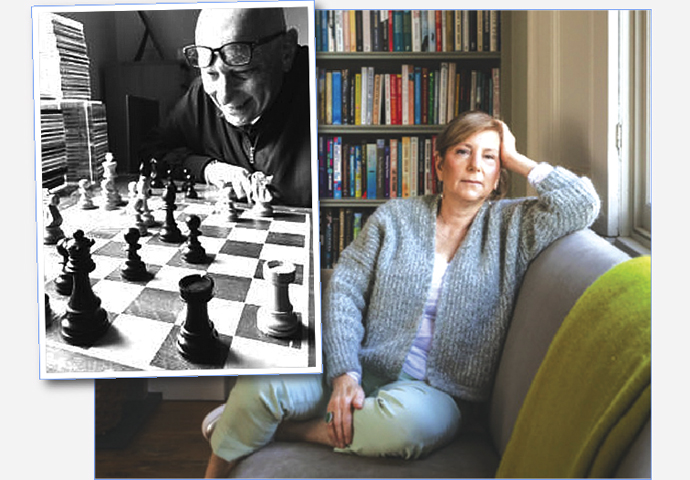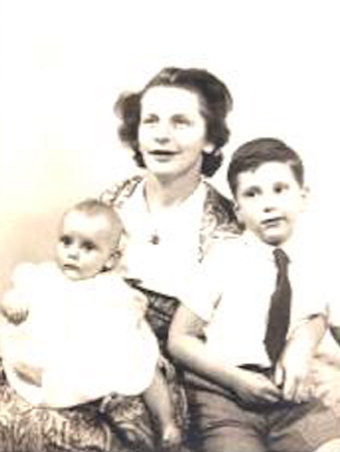Review: Looking After – A Portrait of My Autistic Brother
Caroline Elton writes vividly about how music helped transform her sibling’s autism
Thursday, 10th July 2025 — By Peter Gruner

Caroline Elton and, inset, her brother Lionel
BEING autistic, Lionel from Camden could barely express himself, let alone communicate with anyone – but playing the piano transformed him.
Now his sister, Caroline Elton, a leading psychologist, has written a touching and fascinating memoir about him, Looking After: A Portrait of My Autistic Brother.
Lionel, who died of leukaemia, aged 68, in the Royal Free in 2020 was so gifted that he managed to get into a music college.
Life is often difficult for people with mental health issues, but Caroline writes vividly about how her late mum, Marcia, who died in 2017, was the real heroine of the family.
Although often supported by family and friends, she provided continued support and encouragement to a young man who suffered enormously from anxiety and grew up with few if any friends.
This is a must-read book for anyone who is caring for a similarly impaired person or is interested in the highly complicated condition.
Lionel’s idea of dealing with stress was to get a lift up to the top of Hampstead Heath and sit and watch the sun go down.
The story begins in the early 1950s when Lionel’s parents not only had to deal with his often peculiar habits, but also with the appalling suggestion that prevailed at the time that conditions like autism are often the result of poor parenting. There were even suggestions that at four Lionel should be placed in an institution – a proposal that his mum ignored.
At first Mum’s main desire was to smile, cuddle, and comfort baby Lionel, but he hardly ever responded. It wasn’t until he was 13 that autism was finally diagnosed.

Marcia with Lionel and baby Liz
Interestingly, one of Lionel’s appealing habits was politeness, something instilled in him by his mum at a very early age. Whatever the situation he would always say: “Thank you very much,” and because of this he became much loved by nurses and staff at the Royal Free and Maudsley hospitals. When he visited his dying mum for the last time in hospital he declared: “Thank you for having me.”
Aged just five, Lionel once let himself out of the house, walked to the top of the road, caught a bus to the local tube station, and then a train to Baker Street. Mum called the police, who fortunately found the mute little lad wandering around Baker Street.
Lionel’s dad Miles died 20 years previously but he always regarded Mum as his main support. Indeed, she also was a musician but was thwarted in her early aspirations by the outbreak of the Second World War. She continued caring for Lionel even in old age. Then suddenly at the grand old age of 94 she was dying.
Caroline and her sister Liz were summoned to Mum’s hospital bedside, where they tearfully said their goodbyes. The sisters promised to look after Lionel. However, the women were apprehensive as they both were working and had young children to care for.
Lionel was finally placed in warden-controlled accommodation. She warns that while her brother was fortunate to end up living in sheltered accommodation, today such living is becoming increasingly harder to obtain, according to Age UK
Even with a warden, one day Lionel did his disappearing act. Caroline and support worker Thea had to use a mobile phone tracker device to find him. Lionel had taken a bus to Archway. They later discovered he’d actually used five buses and ended up near the Whittington hospital.
Another interesting note in the book is that Caroline’s family, who are Jewish, are good friends with the Iranian family next door, who were always supportive.
Back to the early days, Mum would often arrange for Lionel to play piano in local care homes. He’d play tunes from The Sound of Music and My Fair Lady to the Beatles or anything else the residents requested. He never needed the music; he played everything by ear.
He also performed at Hampstead Town Hall to huge acclaim from the audience and obvious pride from his family. Lionel wouldn’t normally look people in the eye when talking to them but when Mary, a family friend, arrived and suggested they play a duet on the piano together, it all changed. Lionel was able to hear a person sing and quickly detect what key it was in.
Caroline writes how Mary and Lionel played a piece from Mozart. “Lionel looked up at Mary at the appropriate moments as musicians do, in order to negotiate a change in tempo, or dynamics, or where a motif passed between them. Then Lionel looked her straight in the eye to ensure they finished in unison.”
Lionel never made friends. “But his relative isolation,” Caroline writes, “didn’t necessarily mean he felt lonely. His appetite for friends may well have been different from neurotypical people. I never heard him bemoan or complain about it.”
But there was a multitude of people who knew him and liked him. From the warden in his sheltered accommodation, to neighbours in adjoining flats, staff in the local Tesco, not forgetting the cafés.
When the call came from the Royal Free at 5.30am to say that Lionel needed an urgent blood test Caroline thought it was a scam.
“Hospitals never call at 5.30 in the morning,” Caroline writes. But she soon realised it was genuine. He suffered from severe leukaemia and died in mid-January 2020.
“Lionel exited this world as he entered: Swiftly. A tub of ice cream at lunch, a few spoons at dinner, and then dead before the nine o’clock news, ” Caroline writes.
• Looking After: A Portrait of My Autistic Brother. By Caroline Elton, Hutchinson Heinemann, £14.75